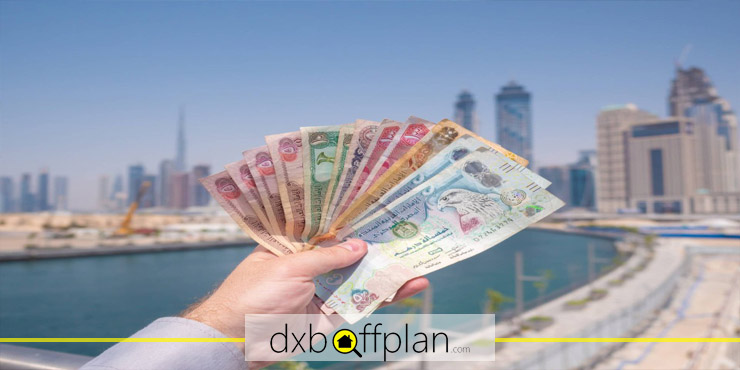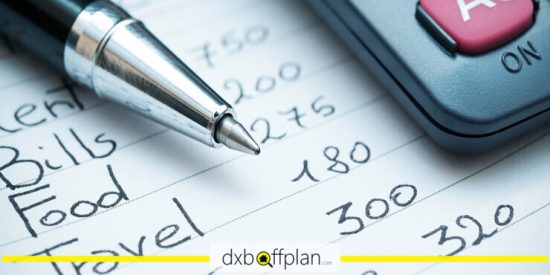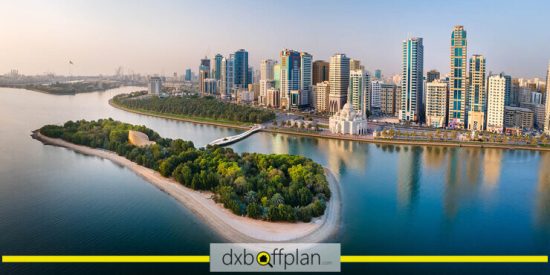كم تبلغ تكلفة المعيشة في الشارقة؟
تقع الشارقة في قلب الخليج الفارسي وتتلألأ مثل جوهرة مشرقة؛ وتجمع بين الثقافة الغنية والتطور الحديث وهي ما جعلها مكانًا جذابًا للعيش والعمل. ووراء هذا الجاذبية تكمن مسألة تكلفة المعيشة، وهي عامل حاسم لكل من الوافدين الجدد والمقيمين منذ فترة طويلة.
ونهدف في هذه المقالة من DXBoffPlan إلى تقديم دليل شامل لتكلفة المعيشة في الشارقة. من نفقات السكن إلى الضروريات اليومية، ومن التعليم والرعاية الصحية إلى الترفيه والتسلية، سنغطي جميع الجوانب لتقديم صورة واضحة وشاملة عن تكلفة المعيشة في الشارقة. دعونا نستكشف هنا ما إذا كانت الشارقة مجرد مدينة أحلام أم خيار عملي للحياة اليومية بأسعار معقولة.
نفقات المعيشة الشهرية في الشارقة
الشارقة هي وجهة مرغوبة للوافدين المقيمين والزوار بسبب مزيجها من الثقافة التقليدية والحياة العصرية. ولكنها تأتي بتكاليف كبيرة بالنسبة للكثيرين، وخاصة الجدد في المدينة. وبناءً على البيانات الحالية وظروف المعيشة في الشارقة، تبلغ نفقات المعيشة الشهرية لأسرة مكونة من أربعة أفراد، باستثناء الإيجار، حوالي 10.168.1 درهم إماراتي. وبالنسبة للفرد الواحد، فستكون حوالي 2.980.2 درهم إماراتي. واليك هنا تفاصيل أكثر:
الإيجار في الشارقة
الإيجار هو أكبر منصرف. غالباً ما يدفع الشخص الواحد الذي يستأجر استوديو في الشارقة بين 17000 إلى 25000 درهم إماراتي سنويًا. وتعكس هذه الأرقام تنوع سوق الإيجارات وجاذبية شراء شقة في الشارقة بدلاً من استئجارها مع مراعاة تكاليف المعيشة على المدى الطويل.
البقالات في الشارقة
تختلف التكاليف الأساسية الأخرى، مثل البقالة، بناءً على خيارات نمط الحياة. فعلى سبيل المثال، تبلغ تكلفة الحليب (1 لتر) حوالي 6.61 درهم إماراتي، ورغيف الخبز الأبيض حوالي 4.25 درهم إماراتي. وتساعد هذه التفاصيل الأفراد على موازنة نفقاتهم الشهرية للمشتريات الأساسية.
تكاليف المرافق في الشارقة
بالإضافة إلى الإيجار والبقالة، تشكل تكاليف المرافق جزءًا كبيرًا من الميزانية الشهرية. وفي المتوسط، تبلغ التكلفة الشهرية للمرافق الأساسية (الكهرباء والتدفئة والتبريد والمياه والقمامة) لشقة تبلغ مساحتها 85 متر مربع حوالي 644 درهم إماراتي. كما أن نفقات الإنترنت كبيرة أيضًا، حيث يبلغ متوسط الرسوم الشهرية لإنترنت بسرعة 60 ميجابت في الثانية أو أكثر حوالي 379 درهم إماراتي.
تكاليف المواصلات في الشارقة
النقل هو جانب حاسم آخر من تكاليف المعيشة. وتعتبر وسائل النقل العام ميسورة التكلفة نسبيًا، حيث تبلغ تكلفة تذكرة المواصلات الشهرية حوالي 230 درهم إماراتي. ولمن يفضل القيادة، يبلغ سعر البنزين حوالي 2.66 درهم إماراتي للتر الواحد. وامتلاك السيارة يعني تكاليف إضافية مثل التأمين الذي يبلغ متوسطه حوالي 4000 درهم سنوياً، ورسوم صيانة ان وجدت.
تكاليف الرعاية الصحية في الشارقة
الشارقة هي مزود بارز لخدمات الرعاية الصحية عالية الجودة. ومع ذلك، فإن تكلفة خدمات الرعاية الصحية في الشارقة يمكن أن تشكل تحديًا لكل من المقيمين والمهاجرين.
ويتم تقديم خدمات الرعاية الصحية في الشارقة من خلال أنظمة التأمين العامة والخاصة. ويتقاضى التأمين العام 320 درهم إماراتي للذين تزيد أعمارهم عن 18 عامًا و120 درهم إماراتي للأطفال دون سن 10 سنوات، لتغطية تكاليف المرضى الداخليين والخارجيين والأدوية والاختبارات. وقد تختلف تكاليف التأمين الخاص حسب التغطية ونوع التأمين وتغطية الجراحة وطب العيون والعلاج الطبيعي وخدمات طب الأسنان. ومع وجود العديد من المستشفيات المتخصصة المجهزة بأحدث المعدات الطبية، يتمتع سكان الشارقة بخدمات رعاية صحية عالية الجودة.
تكاليف التعليم في الشارقة
يعد التعليم أحد الاعتبارات المهمة للعائلات التي تنتقل إلى الشارقة. حيث توفر الشارقة مجموعة من المؤسسات التعليمية، بما في ذلك المدارس العامة والخاصة والدولية. ويمكن أن تختلف الرسوم الدراسية بشكل كبير، حيث تكون المدارس العامة ميسورة التكلفة حيث تتراوح الرسوم الدراسية السنوية في المدارس الدولية الخاصة من 12.000 إلى 50.000 درهم، اعتمادًا على سمعة المدرسة والمناهج الدراسية. ويمكن أن تتراوح تكاليف التعليم العالي في الجامعات من 30.000 إلى 70.000 درهم سنوياً.
الترفيه والتسلية في الشارقة
الترفيه والتسلية أمران حيويان لنمط حياة متوازن. وتقدم الشارقة خيارات متنوعة من التجارب الثقافية إلى وسائل الترفيه الحديثة. وتضم العديد من المتاحف والمعارض الفنية والمواقع التراثية. وبالنسبة للذين يرغبون بالأنشطة الخارجية، يمكن الوصول إلى المتنزهات والشواطئ وغالبًا ما تكون مجانية. وتبلغ تكلفة تذكرة السينما حوالي 45 درهم إماراتي، ويمكن أن يكلف تناول الطعام بالخارج في مطعم متوسط حوالي 200 درهم إماراتي لشخصين.
إيجابيات وسلبيات العيش في الشارقة
وبفضل مزيجها الفريد من الثقافة العربية التقليدية والبنية التحتية الحديثة، تعد الشارقة من المدن الجذابة في الإمارات العربية المتحدة. ولكن هناك بالطبع قائمة كبيرة من إيجابيات وسلبيات العيش في الشارقة التي يجب أن تكون على دراية بها. عونا نستكشف هنا بإيجاز بعض مزايا العيش في الشارقة:
- بيئة صديقة للأسرة: تشتهر الشارقة بأجوائها العائلية.
- خيارات الإسكان وأسعار معقولة: بالمقارنة مع الإمارات الأخرى مثل دبي وأبو ظبي، توفر الشارقة منازل بأسعار معقولة.
- الموقع الاستراتيجي: قربها من دبي يعزز أهميتها الاستراتيجية.
- مستوى عالي من الأمان وجودة الحياة: توفر المدينة مستوى عالٍ من الأمان وجودة الحياة.
- فرص العمل: مع انخفاض معدل البطالة وبيئة الأعمال المزدهرة، تعتبر الشارقة مكانًا مثاليًا للتوظيف والهجرة.
والآن دعونا نستكشف بعض سلبيات العيش في الشارقة:
- لوائح صارمة: مقارنة بالمدن الأخرى، تتمتع الشارقة بقوانين أكثر صرامة.
- المناخ الحار والرطب: يمكن أن يكون الطقس حارًا ورطبًا للغاية.
- حركة المرور الكثيفة: يمكن أن يشكل الازدحام المروري الشديد إزعاجًا كبيرًا.
- تكاليف المعيشة: على الرغم من أنها أقل مما هي عليه في دبي وأبو ظبي، إلا أن تكلفة المعيشة في الشارقة لا تزال مرتفعة بالنسبة لبعض أنماط الحياة.
أخيراً
يمكن أن يكون العيش في الشارقة مكلفًا، ولكن مع التخطيط الدقيق والوعي بالتكاليف المختلفة، يمكنك الاستمتاع بالحياة في هذه المدينة والاستفادة من الفرص التي توفرها. وعلى الرغم من التكاليف المرتفعة نسبياً، تتمتع الشارقة بمزايا يمكن أن تعزز جاذبيتها للمقيمين والمهاجرين.
وللتمتع بهذه الفوائد، يعد التخطيط المالي الدقيق أمرًا ضروريًا. ويمكن أن يقلل اتخاذ خيارات ذكية في مجال الإسكان وإدارة النفقات اليومية والاستفادة من خدمات التأمين بشكل كبير من الضغوط المالية. ومع الخصائص الفريدة التي ناقشناها أعلاه، يمكن أن يكون شراء العقارات في الشارقة خيارًا مناسبًا للذين يتطلعون إلى الاستثمار في الإمارات العربية المتحدة. ويمكن لهذه المدينة، بكل معالمها الفريدة، أن تكون مكانًا للنمو والتقدم والاستمتاع بالحياة.
الأسئلة المكررة
تشمل العوامل الرئيسية التي تؤثر على تكلفة المعيشة في الشارقة الإسكان والمرافق والبقالة والنقل والرعاية الصحية والتعليم. والإيجار هو أكبر النفقات، وتختلف الأسعار حسب الموقع ونوع السكن. ويمكن أن تضيف المرافق الأساسية والإنترنت جزءًا كبيرًا من النفقات الشهرية. وتعتمد تكاليف النقل على ما إذا كنت تستخدم وسائل النقل العام أو تمتلك سيارة. وقد تختلف نفقات الرعاية الصحية بناءً على خطط التأمين والاحتياجات الطبية. كما تختلف تكاليف التعليم أيضًا بشكل كبير، خاصة بالنسبة للمدارس الخاصة والدولية.
تختلف تكاليف السكن في الشارقة بشكل كبير حسب نوع العقار وموقعه. فعلى سبيل المثال، يمكن أن يكلف استئجار شقة استوديو ما بين 17.000 و25.000 درهم إماراتي سنوياً. ويمكن أن يتراوح سعر شقة مكونة من ثلاث غرف نوم في حي جيد من 45.000 إلى 70.000 درهم إماراتي سنويًا. وهذه التكاليف عمومًا أقل مما هي عليه في المدن المجاورة مثل دبي، ولكنها لا تزال تمثل جزءًا كبيرًا من الميزانية الشهرية.
تعتبر خدمات الرعاية الصحية في الشارقة عالية الجودة، وتعتمد تكاليفها على نوع التأمين ومستوى الرعاية المطلوبة. حيث تبلغ تكلفة التأمين الصحي العام حوالي 320 درهم إماراتي سنوياً للبالغين و120 درهم إماراتي للأطفال، لتغطية الاحتياجات الطبية الأساسية. ويوفر التأمين الخاص تغطية أكثر شمولاً ولكنه يأتي بسعر أعلى. ويمكن أن تكلف زيارة الطبيب العام حوالي 150 درهم إماراتي، كما أن الاستشارات والعلاجات المتخصصة قد تكون أكثر تكلفة. لذا من المستحسن أن يكون لديك تأمين صحي لإدارة هذه التكاليف بشكل فعال.










